At SaaStr Annual, we talk a lot about scaling and how to build a successful company, but something that doesn’t get addressed as much is how to steer your career in the right direction. More specifically, in this session, our panelists delve into building a sales career.
Bill Binch, Managing Director Australia/New Zealand at Marketo, sits down with Marc Huffman, SVP at Netsuite Global Business Unit at Oracle; Lesley Young, Global VP Sales at Box; and Jeff Serlin, VP Sales Operations & Strategy at Campaign Monitor, to talk about finding a mentor, the importance of sales enablement, catching red flags with potential hires, and learning when to move on from a role.
And if you haven’t heard: SaaStr Annual will be back in 2018, bigger and better than ever! Join 10,000 fellow founders, investors and execs for 3 days of unparalleled networking and epic learnings from SaaS legends like Eric Yuan, Tomasz Tunguz, Chris O’Neill, and Mikkel Svane. If you don’t have tickets, lock in Early Bird pricing today and bring your team from just $999! (All ticket prices go up December 1st.) Get tickets here.
TRANSCRIPT
Announcer: Ask anyone in SaaS, who the truly legendary sales executives are and you’ll hear Bill Binch 9 times out of 10. Please welcome back second timer SaaStr Annual speaker Bill Binch, now Australia and New Zealand Managing Director at Marketo.
Bill Binch: Good afternoon, everybody. Jason Lemkin and I last year had a conversation about SaaStr’s theme for this year. He said, “You know, Bill, there’s a lot of folks that will be talking about how to grow to 10, what to think about at 50 million. I want to do something different.”
We thought, “Let’s talk about how people in the SaaS world have grown and navigated their careers.” Today, I’ll be joined by a very exciting panel to talk about navigating our careers and how we’ve maneuvered ourselves in the business world and some things to think about for founders and other folks in the SaaS world.
Please welcome up my colleagues Jeff, Lesley, and Marc.
Bill: On my immediate right here, we have Marc Huffman. Marc and I go back 20 something years. He began his career at Oracle and was one of the first people to make the leap to a small company called NetSuite, which was one of the early innovators in the SaaS space, where he spent the last 13 years and is now, after the acquisition through Oracle, the Senior Vice President of Global Sales for the business unit.
Welcome, Marc.
Marc Huffman: Thank you.
Bill: In the middle, we have Lesley Young, the Senior Vice President of Global Sales for Box. Lesley, like Marc and myself, started her career in the on premise perpetual software side with companies like Remedy and Informatica. She’s then moved herself into the SaaS world and has spent the last five, six years at Box, leading their sales organization.
Finally, we have Jeff Serlin on the far end there. Jeff started his career in sales operations and strategy, like most sales operations and strategy folks do, he was an engineer for General Motors, but the call of the wild, the call of the West brought him out here. He’s been with companies like E2open, Emptoris, Marketo, and now Campaign Monitor.
Folks, thanks for joining me this afternoon. Let’s dive in.
We’ve all been working in the tech business for 20 plus years and have had moderate levels of success in growing our careers to executive levels, but we didn’t do that alone.
Let’s talk about mentorship. Let’s talk about people that helped you visualize and navigate your careers. If you could, share a couple of personal anecdotes of those people that have helped you and possibly even share how you’re giving that back today to the next generation of workers.
Jeff, why don’t we start with you on the end?
Jeffrey Serlin: There’s two people I would consider key mentors. They gave me advice. They gave me counsel. They gave me coaching. I think looking back at this, the most important thing they did was they truly invested in me and in my career. I think that’s different than just giving advice.
In order to get somebody to really want to be all in on you and to invest in you, it’s a hard thing to do. It’s something that you have to earn. I think you earn it in a few ways. First of all you have to build that relationship. You have to nurture it.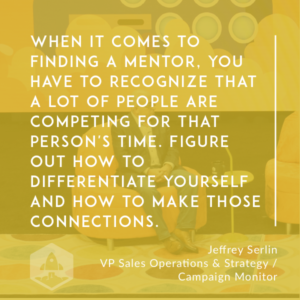
You have to recognize that a lot of people are competing for that person’s time, so figure out how to differentiate yourself, figure out how to make those connections. Use people that know them to get those introductions and get to know them.
I think the other thing you have to do is perform at a high level. It’s not just that, but it’s how you do that. You have to do it showing that you have the potential to grow, showing that you can take on additional responsibility, and I think doing it very professionally.
I think what I mean by that is when they go in, if they’re truly investing you into a meeting with their peers or their management and they’re talking about who should fill that very important role that they created, or who should head up an important project for the company, or who should get that promotion and they say your name.
You want the rest of the people in that room to shake their head in agreement because they know you. They know how you’ve performed. They know that you’ve shown potential. They know that you’re ready for that additional responsibility.
If you think about it that way, you’re making it very easy and very safe actually for that person to not just be your mentor, but to truly invest in you because others see what he sees in you as well. I think the takeaway from that is, be proactive on building a relationship in the beginning.
Don’t expect for it to just happen. Earn them that right for them to move beyond just coaching you and guiding you to truly investing in you. Through performing well, and delivering results, and also the way you carry yourself at the company.
Bill: Got it. That’s good, thanks for that. Lesley, your thoughts on mentorship?
Lesley Young: I would agree with a lot that’s been said. I would add in the companies that we’re all in, high growth companies. There are tons of opportunities to solve problems. Come up with solutions to different growth problems that may be happening in the organization. I’d say put together a business plan if you believe in it.
One of the places where that really helped me was at Informatica. I went to my boss after about four months and told them I was bored. I said, “What else can I do?” I had three or four different ideas. I think that’s critical. I had a business plan for why it was good for the company. You look for those. As you said, that establishes a certain reputation.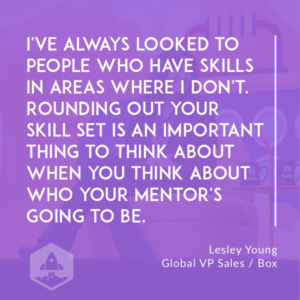
As far as the people that I’ve had over the course of my career, I’ve always looked to people who have skills in areas where I don’t. Rounding out your skill set is an important thing to think about when you think about who your mentor’s going to be. I’ve always tried to go into it with what’s in it for them to spend time with me.
You said something really important. You got to be a performer. You’ve got to do the job that you’re hired to do well. You got to come up with a solution to a problem that might be going on. Think about why they would be invested in speaking with you, whether that’s identifying a problem or a solution.
The last one is to the other side of that, what do I do now, because I benefitted hugely from those mentors. They weren’t mentors that I actually established as a mentor. It was through being curious and asking a lot of questions in things that they might be experts, but have a clear goal in what you want to accomplish by having a conversation.
If you want a mentor or seeking out a mentor, recognize that there’s a certain amount of time that they have. Make sure you know what you want to take away from the interaction that you’re having with them.
I generally will respond to people who figure out what my schedule is. Where the free points are like coffee is always a good one. It’s super important for me and this should be a lesson to people in the audience. I get in the trenches when I have those conversations. There’s a lot of give and take. I find out a lot of information about what do we need to change.
Finally, I would say, remember that those are the people when opportunities turn up in their network, they’ll think of you, present you as a potential candidate. It’s also about making sure that you’re building a good resume, and that they’re aware of what you’re doing, and the accomplishments that you’ve had.
Bill: Has there been one person across the span of your career that stands out as the most meaningful mentor?
Lesley: Yeah. I would actually say it’s Mark Burton who I worked with at Informatica and for My SQL because we were in two different company cultures. One that was paranoid, which was Informatica and then My SQL, which is open source, a very different mindset. He taught me how to lead.
Bill: That’s great leadership lessons. Marc, how about you?
Marc: I’ve been fortunate somewhat through happenstance. I’ve had a lot of variety in the mentors that I’ve had. I’ve had somebody who’s very driven, very direct, very hard charging. You and I work for that person.
I worked for another individual that was really hands off, really trusted the people to get things done. I learned a lot of different…Those two things are really diametrically opposed. I learned a lot about how I didn’t need to just drive people myself. There were some times you could back off, allow people to innovate, do some of their own things.
I’ve worked with another individual who’s mentored me, who was very analytical and very strategic. Seeking that variety is something that’s been unique for me. I’ve been able to not just model behavior based on one particular style and then get in a rut with it.
I used to be a lot more demanding earlier in my career. Now, I’m a little more hands off, little more forgiving. I try to be as direct as possible. I try to be as warm as possible.
What I’d say to people in the room who are interested in finding ways to develop either means that they can mentor others or perhaps you’re trying to find some mentorship is…
If you look at things today, there’s this talk about fake media and the politics. Everybody’s trying to shape opinions about things. We all want the truth. My business, I want transparency.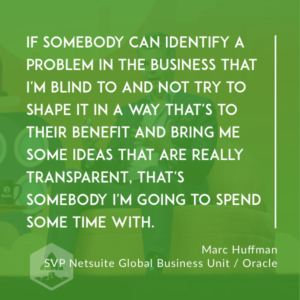
If somebody comes to me and they can really, honestly identify a problem in the business that I’m blind to and not try to shape it in a way that’s to their benefit or to make themselves look good, but just to help me identify a challenge we have in the business that we haven’t identified already, and then bring me some ideas and dialog that are really transparent, that’s somebody I’m going to spend some time with.
That’s an opportunity for somebody to actually develop a relationship that can move into something around mentorship. Mentorship is almost an investment, a personal commitment that we all make in the people, or people have made in us. You want to do that for people that are thinking along those lines and are really committed to their development.
Bill: That’s great. I have a friend, John Hunter. He ran sales for CA North America. Now, he’s at BMC running a large sales team. He has a concept that he uses around mentorship that he calls Learn, Earn, and Return.
He said that your life is basically about learning, in your early years, your craft. You get good at it, you start earning some money, you start building your personal brand, you maybe elevate yourself to an executive level. That’s your cue of when to start returning it back. I like that thought a lot around the ideas and concepts of mentorship, so thanks for sharing yours.
In transitioning that, to get people to be successful, and I think I heard about hard charge and driving people, sale training and sales enablement are critical factors, especially in a sales organization, to delivering results, to having high execution.
As all of you have been with early stage companies, the question I’d ask is, when do you commit resources to sales enablement? How do you measure the impact that that sales enablement and that training is having on your organization? If you can, what does the sales enablement function look like inside of your companies today?
Lesley, why don’t we start with you? Box is well known for Doug Landis having been there for a number of years and driving the whole sales enablement piece. Love to get your thoughts first.
Lesley: I’m going to break that one, because I actually was the originator of the sales training at Box when it was little. Jim Hurbel, who the original VP of sales at Box told me, “Don’t do it.”
At the time, we had sales people, and there was enough so that you could sit side by side and get it out of each other’s brain. When I looked at the plan that we were going after, there was a huge ramp that was going to happen. You just couldn’t keep doing the side by side sit down.
We had to figure out how to get all of that rich knowledge out of the brains of the folks who’d been there and been successful. We actually enlisted the whole company to participate in a section. That obviously evolved. What it did is it created a class, which is super important.
When you have a situation, when you have three to five people that are coming in at the same time, that network of those five people, or three people, is critically important. They are the same set of group that you might have as the first salespeople in an organization.
It becomes their people. That’s really important that you have somebody to connect with that’s been through that same experience that you’ve been through. We wanted to create that.
Secondly, we realized that those folks who are most successful, we could only scale them if we could take what was in their heads and get it into documented format.
Finally, we realized that, we had one long room like this, you couldn’t actually continue to communicate down the hallway anymore. We actually had to start figuring out how to link the organizations together and the processes together.
That was early on. Yes, Doug did come in and he ran our sales enablement function. For a time, he reported to me, because I also took that on later.
I think what that evolved to was a couple of things. It was very much of, “What is this single story we’re all going to tell about what Box is, and what it means to an organization?” As you can imagine, as you have field sales folks across the globe, the story starts to change a bit.
One of the big things that we focused on that is critically important is making sure that the story is the same, the value proposition is the same, that everybody is telling it the same way, that what our CEO Aaron says translates down to what’s important to the director of IT.
That takes a lot of work across a number of different teams, whether that’s the product marketing team, the marketing team, the sales engineers.
We had a stop/start where we realized that was a challenge, that we had like 16,000 different decks out there that told our story. We then started doing online training and certification. That happens when you start to have, I would say, 100 sellers.
When you have 20 sellers, you can do that in a room, but when you start to get global, it gets very hard to do. Now, we have an online process that’s combined with a couple of different events, which is obviously our SKO, which is the beginning of the journey every year for everybody.
We have mandatory training each quarter after that, where everybody gets certified. We make it fun. We do some gamification to do that.
The last thing is, for each one of the organizations, there’s a certain culture that they have, that they do as part of the QVR process.
Bill: That’s great. Jeff, you’ve had to create sales training inside of organizations you’ve worked at in the past, would you please share some of your thoughts around how to do it, around, like I said, how you know it’s having an impact in the org?
Jeffrey: Yeah, I think of the four companies I have joined in the last 10 years, only Marketo, I think, had an existing headcount in sales enablement and they had one. Every single one of those companies, if they had invested in sales enablement and productivity earlier, they would have been in a better place.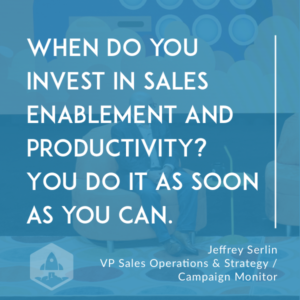
The question as to when do you do this, you do it as soon as you can. If you’re adding people to the sales organization at a steady stream, even if it’s just a couple of quarter, it’s time to start thinking about making sales enablement formal.
The reason is, because it’s more than just the logistics around training. It’s finding inefficiencies in the selling process and correcting them. It’s maybe even defining and developing that methodology and conforming it to your company. It’s onboarding programs. It’s ongoing programs to maintain the knowledge that you need to be successful.
It’s deploying tools and aids. It’s 100 percent critical, I think, to fully leveraging the investment that companies are making in the sales team.
How do we do it? Right now, we’re doing it as a team sport. It means it’s shared between myself and some SEs, marketing, and also management. We actually did a quick three day kickoff last week. We brought everybody together.
It was fantastic that everyone got on board to what the mission of that was. It wasn’t slide heavy. As Lesley mentioned, we made it fun. We had a session called Storytelling. I picked, because I’m new to this organization, about five reps that I thought sold good deals, sat with them and told them how I think you should structure that story, and they put these together. They presented it back for their peers.
Onboarding other people, and encouraging other people to participate in those efforts, especially the people that are out there actually dealing with customers and selling deals, I think, makes it into something that you can get off the ground if you don’t have a dedicated person.
The value is it makes everything better. You identify metrics that need to get better, or ones that are doing well, you can put in tactics and enablement that improve the things that you need to improve, and lean further into the ones that are performing well.
Again, I think that my advice to everybody, especially earlier in their career is take it seriously. It’s really there to make you more successful at the end of the day because the company can’t be unless you are.
Don’t look at it as a day that you’re sitting somewhere and going through activities and events. Prepare for it, listen. Don’t have your cell phones on the table. Participate if you get a chance to do this. Ask questions. Absorb all of the learnings. At the end of the day, it helps you as much as it does the company.
Bill: Team sport, like Lesley said.
Jeffrey: Absolutely.
Bill: Great, Marc?
Marc: There’s a real tight correlation between company culture, organizational culture, and enablement. One of what Lesley said rang true with me, is you’re small and you’re one location, you got a ball pen activity, you organize people in a way that they can share information, it becomes part of the DNA of the organization.
It’s a really productive thing. As you expand, you move beyond one location, to answer your question about timing, or you move on multiple floors, or maybe there’s a space constraint. Word does not travel through walls. It certainly doesn’t travel across the ocean. You’ve got to create these mechanisms. Enablement is a great mechanism for it.
The class situation that Lesley described just instantly brought me back. I can remember vividly the first enablement class I was at Oracle. I had some great friends that came out of there. Brian Goldstein, I’ve known for a long time. Ryan Roskovensky from RJR Partners is a guy that I’ve done business with for a long time.
You develop this esprit de corps with the people you work with, and again, tightly coupled with your culture, it makes people stick around in your organization. It makes them feel like they belong to something.
I would say the time to invest is as soon as you can break the mold of…or you have to break the mold of location there, but if there’s a founder in the room or somebody who has Head of Sales or anything, and you want to know when to invest, you spend a lot of time talking about go to market, developing leads, spending a lot of money. These types of companies spend a lot of money on sales and marketing.
Take your founder out on a sales call with every quota bearing head you have. If you’re ever disappointed in the message or the quality of the sales process, look yourselves in the mirror and say, “It’s time to invest in enablement.”
Bill: It’s great advice. At Marketo in the early years, Bruce Cleveland was one of our first investors. He had been the former CMO of Siebel. He told me, “Bill, you need to hire sales enablement.” We were doing well. I waved it off and said, “Hey, I got this. People are learning through osmosis. They’re doing well. They’re training each other.”
He said, “You got to do it.” In every board meeting, he’d say it. Today, every time I run into Bruce, first thing I do is hug him. The second thing I say is, “Hey, have I ever said, ‘You told me so’?” He goes, “Every time I see you, Bill.”
He told me so, and it’s exactly right. Your advice about going out on a sales call with your CEO, you’re right. If you’re a little bit underwhelmed by the message that you get out of the rep in Boston versus the rep here in San Francisco, and they’re different, it’s telling you right there that…
Marc: Think about how much money and resource goes into that just getting that opportunity to present and talk to a prospect.
Bill: Exactly.
Lesley: On that one, one of the things that we’ve been doing in looking at cohorts of when we hired people in the cohorts. It’s been really interesting to watch how much faster through a Box camp and this learning we are able to ramp the reps. What you just said about the sales calls, that’s exactly what happened because Aaron came back to me and said, Dan, our COO, and said, “Everybody is saying something slightly different.”
Marc: Usually, it’s fire the guy, he’s no good.
Lesley: [laughs] Yeah, which is not that. A lot of it has to do with what we’re doing and how much they’re left alone.
Marc: It’s incumbent upon us.
Lesley: It used to be, how do you actually manage productivity? Do they develop pipeline faster? Do they actually get to revenue faster? We’ve been able to prove it over looking at cohorts and what…
[crosstalk]
Marc: Thinking about the data side, a lot of our worlds in this industry are around new business acquisition. The time you recruit somebody to get them on board, train them, to their first dollar, and then your company gets to take that ratably over time, there’s a big upfront investment. The best, most important metric is how you go from day one to revenue.
Lesley: Absolutely.
Jeffrey: We used to have a dashboard we called First Blood. It was an enterprise company. Everyone stayed up on there. You watched their pipeline build. They stayed on that dashboard until they sold their first deal.
Bill: That’s great. All right, let me ask some individual questions. Lesley, I’ll start with you. Box, when it started, was initially headquartered down Los Altos. You could almost say Mountain View.
Lesley: [laughs] We used to call it South Palo Alto.
[laughter]
Bill: Yeah, South Palo Alto. Meanwhile, an explosion was happening here in San Francisco, that the cloud SaaS business was really forming here. We saw a change. A lot of the people that were coming to work for us no longer owned cars, didn’t want to do commutes. How did you go about hiring top talent and recruiting them to come all the way down to Los Altos?
Lesley: It’s a really good question. Initially, we had shuttles. That was a must have. We made sure that we had a lot of things to do on those shuttles. In other words, you could connect. Today, we got the headquarters in Redwood City that is right there on the train station, but that doesn’t solve it.
We did have to give in. We have a building on First and Mission. That houses our sales organization. What’s really interesting is we had to do the exact same thing when I was at Informatica before the dot com bust. It is very cyclical.
One of the things that we have had to do is actually go where the talent is. I hate to say it. We were talking backstage, but you’ll find that there is the crowd that’s single and is doing everything in the city, and then the married crowd with family that’s down in the South Bay.
We’ve actually also had to scale across North America and create a curriculum pass so that people can matriculate into the field because we also had the challenge of, “Well, if I want to go into the field, I have to move.” You have to solve for that one, too.
Going back to the original question about the city, what was really interesting is we had the same thing happen with those classes. When we were in South Palo Alto, the classes actually started to travel together.
We had these four guys who used to come in their car every single day together. They got really, really tight. That actually continued. It created this network and camaraderie that they had to do those commutes in the early days.
Now, what we try to do in the city is we’re trying to figure out how do we actually get that spread out across the organization into New York and Austin and keep the city one. That presents a whole other set of problems. I don’t know if that answers your question, but…
Bill: Got it. Jeff, along those lines, talking about a lot of younger generation of workers, millennials, meantime in your career, if I contrast that, your last few companies, you worked for Golden Gate Software which got acquired by Oracle.
You then went to Emptoris, which got sold to IBM. You then joined Marketo, IPO ed with them, three really great hits. I guess the message is, we should all try and get some stock inside Campaign Monitor or something right now where you’re at.
If you look at that, do you think that the typical young person coming out of school right now and beginning their career is thinking, “That’s what I’m going to do. I’m going to go work for a company, get acquired, go to the next one, get acquired, go to the next one, IPO”? What’s your mindset around the millennial thinking and the new generation of workforce that’s coming up right now?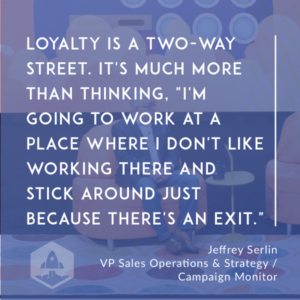
Jeffrey: Thank you for the question. Loyalty is much more of a two way street. It’s much more than thinking, “I’m going to work at a place where I don’t like working there and stick around just because there’s an exit.”
Everybody wants to work at a job where they’re fulfilled, where they’re challenged, where they can grow, where they’re empowered, at a company that’s growing and has a future but also in a culture that is compatible with their own personal values.
What that’s doing, and you’re talking about loyalty in a sense, is it’s forcing companies to take action to deliver the things that keep employees there much more than just words. It might have been once a year where someone gets up at an all hands and says the values, and it might be on their career page. It’s really forcing companies to really deliver against that. Overall, that’s a really good thing.
There’re certainly generational differences and expectations around those and what they mean and how you get there. I don’t think we want to go into a lot of those today.
The good thing is people are starting to learn the techniques to deal with those, the techniques to work more into the timeframe around expectations of promotion and more frequent feedback and different reward and praise that isn’t necessarily monetary.
There’s a lot of research out there that people can leverage if they’re dealing with some of those issues or trying to figure it out. I also think that one thing that has helped is the evolution of the HR function. It’s gone to people operations, and employee success.
The mission of employee success is to build programs and a culture to increase employee engagement, which ultimately leads to greater satisfaction and begins to address some of those challenges that you talked about, and get people to want to stay at this company because they like working there, they like the culture, and by the way, they also like the prospects.
Bill: That’s great. There is a book, if you haven’t read it, written by Reid Hoffman, who founded LinkedIn called The Alliance. He touches on a little bit of that topic, that our generation, previous generations were viewed as good workers if you were loyal, and you were there for 10, 20, or 30 years.
Today’s generation is much more about, “If I’m providing value to you and I’m getting value back,” meaning the employee, “I’m giving and I’m getting back from the company, then it’s worthwhile,” but at some point, that shift changes.
The employee stops getting value from the company or vice versa. That’s the time that The Alliance…It’s OK. Just be mature and transparent about it. It’s OK to break up at that point. Good stuff, The Alliance. I recommend you get it if you haven’t flipped through it.
Marc, I saw you speak in early 2016. It was someone asking you about your 13 years at NetSuite. There was a really interesting question that you were asked.
It was, “If you look back over that timeframe there, were there any decisions that you could change if you could?” You shared a story about shooting “Old Yeller.” I thought it was a great story, and I was hoping you’d share it with the audience today.
Marc: I knew you loved that story. Just hearing you say that actually makes me feel old…
[laughter]
Marc: I will. Inherently, if you’re in a leadership position, you are faced with decisions made on personnel, human capital and people in different roles. Quite honestly, it’s the most important thing that we do.
The story that I was telling there was about a regret that I had in terms of not being as active as I might have been because of the popularity or the long service of a particular employee. We need to all come to grips with the people in our roles, we all have an expiry.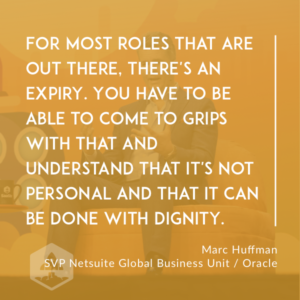
In fact, in most roles that are out there, there’s an expiry, where you no longer become productive. You’re not into it, the company is not into it, the industry has changed, what have you.
When you can come to grips with that and understand that it’s not personal, and it can be done with dignity and whatnot, it’s obvious to the people around you, but you’re the last person that sees it and you don’t want to pull the trigger that it’s time to do something like that. I regretted not doing that. That was the answer to the question about one thing I would do differently.
I would just say it to everybody in the audience, in the book or the movie, it’s a metaphor. As they have to put down Old Yeller who’s a very popular dog, it was like this transition into adulthood for the kid. It’s a transition into you becoming a much more mature and strategic leader.
Chances are, if you know it needs to happen and you’re uncomfortable with it, everyone else knows around you that it needs to happen.
Being very straightforward and transparent, the other individual on the other side of it probably knows it should happen as well, and there might be that loyalty link that’s still there, but the balance, the value between the two parties doesn’t exist anymore and it’s time’s up.
Bill: Part of the reason I like that story is because, after eight years at Marketo, I think I became Old Yeller. My boss had a chat with me and that precipitated the exit of me out of Marketo. A year later, I’m back at Marketo. That’s a different story, but an interesting one.
Marc: We all will be Old Yeller.
Bill: Yeah, I was old yeller. We’re good. Thanks for sharing those stories. Let’s go back to group question here. I’m guessing that between the three of you, you’ve probably conducted thousands of interviews over your years in the business.
I’m curious, what are the landmines that you look for either on the resume, in the interview, in the reference story that you’re getting? What nuggets can you share with the audience, there are things that they should be wary of? Marc, why won’t you start?
Marc: First of all, I can’t believe people still print a resume on a piece of paper. Please, stop. That just drives me crazy, that buyer/seller dance.
We’re interviewing people to be in sales positions most often or pre-sales positions or something, it’s like a sales environment. They’re selling their skills for me that I have. I need somebody to sell something for me.
As anybody would who is any good at sales, they want to understand what’s the other person’s priorities and what they’re trying to accomplish.
If anybody ever slight took control of the meeting interview with me and say, “Hey, Marc, before we get together and we talk about my background and all these things that I’ve done, I really want to know what you’re trying to accomplish, what you’re looking for. What are the skills that you’re looking for in the people that you hire?”
If somebody was mature enough to do that, my meter for them just goes up substantially and I’m engaged. I’ll tell them basically what my hiring criteria is, and then they’re down this process how they can try to match their skills to my hiring criteria.
I’m just amazed at how few people take that tactic and I’m not sure why. There’s a pointer out there for anybody who’s looking to interview better. That’s a big one in my opinion.
Bill: It’s a good one.
Lesley: It’s a great one. I would say if it looks too good, there’s a surface level, one. I try not to review the resume because you should always go in having reviewed the resume and have a couple questions about what you’ve seen there.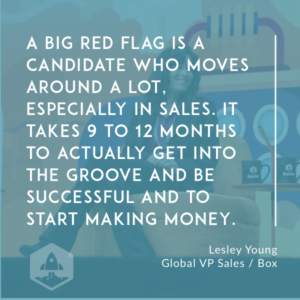
A big red flag for me is somebody who moves around a lot, especially in sales. Honestly, it takes 9 to 12 months to actually get into the groove and be successful and to start making money. If you’re in sales, that’s when the money comes.
I pick two or three things that I dig into, most of which are around what are their critical thinking skills? How do they problem solve? Because in selling, that’s what we’re doing is solving problems. Understanding other person’s point of view.
What you just said I think that was an excellent one, is what matters to them? I actually have them walk me through a story of something like that. What I’m trying to get to is level of detail. If we can’t get to the level of detail, then that’s a red flag for me.
I, again, because it’s a sales job, I’m generally looking for them to tell me the story about their success. Oftentimes, that has to do with how did they hit quota attainment? What was unique about the way they approached the sale?
We all are in a high growth companies, so you need people who are comfortable with change and who are also comfortable with trying to figure out how to do things differently to maximize their opportunity. Those are the things that I really look for in a candidate.
Bill: How about you, Jeff?
Jeffrey: Lesley brought up a great point as I like to look for people that…it’s OK to move around and to change but show me that you’ve been somewhere for a period of time where you’ve gotten more responsibility, maybe a promotion or two and had some success over a period of time, I think is important.
I interview a lot of people that are not in sales. A lot of our partner organizations, finance and marketing and success. The accomplishments are not as black and white as it is when you’re dealing with sales folks, but it’s still about accomplishments.
I read a lot of those resumes and have those interviews, and people either write or they tell me what they did, but they should tell me more about what they accomplished and what it meant to the business and the impact and change it drove for the business.
I that’s akin to not giving enough details of what it actually impacted. Everything that you put in your resume, everything that you potentially can talk about, every question you’re asked, think of it in terms of accomplishments. Think of it in terms of the impact and the change that it drove to the business. Have good narrative and story around all of that, I think is critical.
Bill: Yeah, so true. One that I look for is before I do the interview, I ask all my candidates to send me their references. I promise them that I won’t call them until we move forward.
I’m looking for something. If I see somebody send me a set of references and I don’t see somebody that was a former manager of theirs at some point, that to me is a sign because that means…
I understand not putting your current manager on there, because you’re probably working for that person. Obviously in the past, if there’s no former managers, then I really wonder what’s the person that managed that person going to say and what’s that person afraid of?
For me, that’s always the landmine that stands out for me.
I want to thank my panelists for joining me up, Jeff, Lesley, and Marc. I want to appreciate the time you’ve come to spend and share your insight with the audience.
Thank you very much for joining me today.
[applause]
Marc: Thanks, Bill.
Jeffrey: Thank you.

